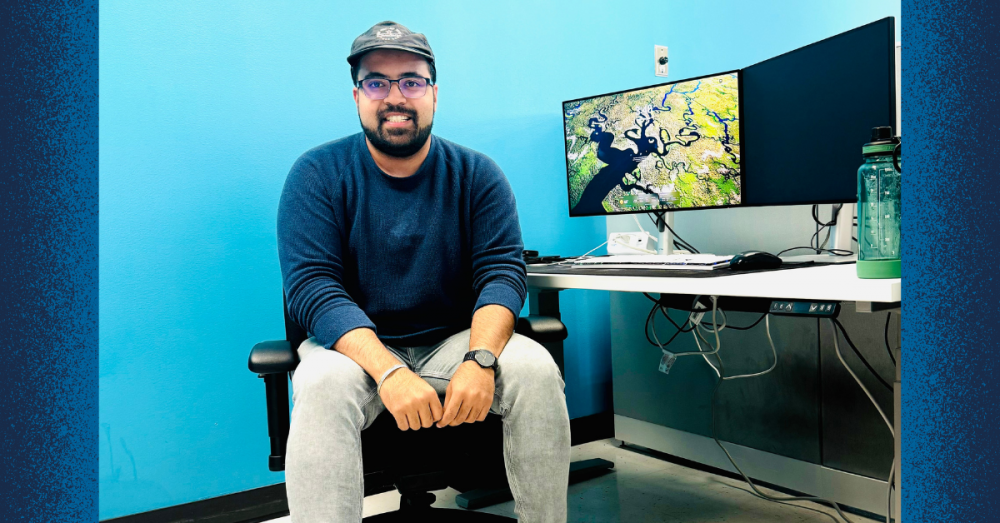
Rachit Chhabra, a UC San Diego mechanical engineering alumnus, shares insights from his journey through his master’s program, including his reasons for selecting UC San Diego, the courses that impacted his career, and his current life as a professional at Qualcomm.
Attending UC San Diego for graduate school was a logical choice for Chhabra, due to its faculty expertise in robotics, the nearby vibrant tech ecosystem, and the alluring proximity to the ocean. Once at UC San Diego, Chhabra dove head-first into courses from multiple departments, expanding his knowledge of engineering in a multidisciplinary approach.
“I specialized in robotics, which fascinated me. I took a variety of courses from the Mechanical and Aerospace Engineering, Electrical and Computer Engineering, and Computer Science and Engineering departments taught by several exceptional professors,” he said.
Chhabra credits two courses, Sensing & Estimation and Planning & Learning, as instrumental in his foundational understanding of robotics. With topics such as simultaneous localization and mapping (SLAM) and robot decision-making, the courses provided the groundwork that would impact his future trajectory.
“Despite being two of the most challenging courses in robotics I took at UC San Diego, these classes laid the foundation for most of the algorithms used in the field today. The knowledge I gained has been invaluable in my career”, he said.
Gaining Practical Experience
Emphasizing the importance of hands-on knowledge, Chhabra noted that his research in the Safe Autonomous Systems Lab with Assistant Professor Sylvia Herbert, and the Existential Robotics Lab with Associate Professor Nikolay Atanasov, was paramount to his professional growth.
“I implemented the knowledge gained from my classes towards practical applications at the lab, specifically working with F1-tenth-scale autonomous cars. I always intended to enter private industry after graduation, and the combination of rigorous coursework and practical research experiences equipped me with the tools I needed, and amplified my enthusiasm for robotics.”
During Chhabra’s time at UC San Diego, Professor Herbert’s guidance left a lasting impression on his career.
“After attending Professor Herbert’s ‘Safety for Autonomous Systems’ course, my drive to study robotics was solidified. As my research advisor, she was my go-to person for a multitude of advice, including course selection, professors, research, and interview preparation. Her dedication to finding resources and solutions for her students was admirable, and I feel fortunate to have worked alongside her.”
His Career Today and Giving Back
Today, Chhabra is an engineer for Qualcomm's Automated Driving Team which develops scalable platforms for advanced driver-assistance systems (ADAS) and automated driving (AD) applications. The team strives to aid automakers and Tier-1 suppliers in creating safe, power-efficient, and thermally optimized ADAS/AD solutions.
“I am responsible for integrating software onto the vehicle platform, ensuring the system-level performance of advanced ADAS features is thoroughly evaluated and optimized for safety and reliability. My graduate program played a crucial role in preparing me for this position, as my courses formed a robust knowledge base that I build upon daily.”
Now as an industry professional on the other side of the table, Chhabra is actively giving back to the Jacobs School of Engineering community through his involvement in the Jacobs School’s IDEA Center Engineering Community Hours.
“These informal gatherings provide a platform for students to interact with industry professionals without the pressure of a formal event such as a job fair,” said Chhabra. We discuss a variety of topics and interview techniques. It’s a wonderful opportunity to engage with industry experts and faculty collaborators, fostering a supportive community within the Jacobs School of Engineering.”
Keys for Success
When asked what advice he has for incoming or potential students, Chhabra emphasized leaning into campus resources for support.
“UC San Diego is brimming with resources waiting to be tapped. Talk with professors as much as possible, seek guidance from graduate department advisors, and engage with career counselors. They’ve interacted with countless students and can provide invaluable insights. Feeling overwhelmed is normal, so take a deep breath and tackle things one step at a time.”
For Chhabra, integrating time for rest and renewal was vital to his success.
“Maintaining a healthy balance was crucial during my time at UC San Diego. I joined a study group where collaboration was key. I took breaks, enjoyed sports, hiked the scenic areas around campus, and enjoyed the beach, all of which helped with stress management.”
Finally, maintaining a spirit of openness and exploration was essential along Chhabra’s journey.
“Keep an open mind, explore different fields, attend lectures for multiple courses and seminars, and discover what truly excites you. Graduate school is a process of self-discovery, so embrace it!”
